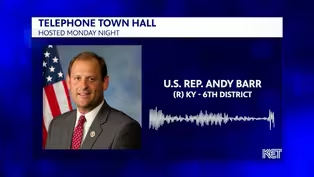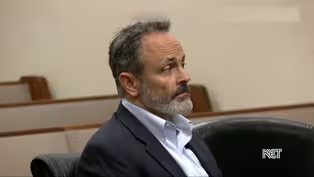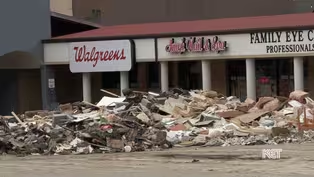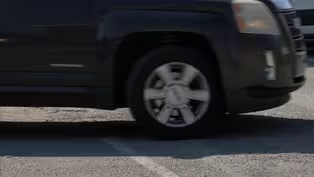
McGarvey Warns Against Trump's Sweeping Tariffs
Clip: Season 3 Episode 214 | 6m 38sVideo has Closed Captions
The Kentucky Democrat says tariffs are bad for the bourbon industry.
Kentucky's lone Democrat in Washington says when it comes to President Trump's tariff policy, one only needs to look at his first term to see the impacts tariffs had on the bourbon industry. Third District Congressman Morgan McGarvey of Louisville says across-the-board tariffs on the nation's trading partners and allies hurts Americans.
Problems playing video? | Closed Captioning Feedback
Problems playing video? | Closed Captioning Feedback
Kentucky Edition is a local public television program presented by KET

McGarvey Warns Against Trump's Sweeping Tariffs
Clip: Season 3 Episode 214 | 6m 38sVideo has Closed Captions
Kentucky's lone Democrat in Washington says when it comes to President Trump's tariff policy, one only needs to look at his first term to see the impacts tariffs had on the bourbon industry. Third District Congressman Morgan McGarvey of Louisville says across-the-board tariffs on the nation's trading partners and allies hurts Americans.
Problems playing video? | Closed Captioning Feedback
How to Watch Kentucky Edition
Kentucky Edition is available to stream on pbs.org and the free PBS App, available on iPhone, Apple TV, Android TV, Android smartphones, Amazon Fire TV, Amazon Fire Tablet, Roku, Samsung Smart TV, and Vizio.
Providing Support for PBS.org
Learn Moreabout PBS online sponsorshipKentucky's lone Democrat in Washington, says when it comes to President Trump's tariff policy, one only needs to look at his first term to see the impact tariffs had on the bourbon industry.
Third District Congressman Morgan McGarvey of Louisville says across the board, tariffs on the nation's trading partners and allies hurts Americans.
He says the president would be wise to listen to political leaders from both sides of the aisle, sounding the alarm against sweeping tariffs.
Well, how concerned are you about Trump's tariff policy?
I'm extremely concerned about Trump's tariff policy.
Let's face it, it's going to make all the stuff we buy here at home more expensive.
And the retaliatory tariffs here in Kentucky are going to put Kentucky jobs at risk.
This isn't a guess because we saw what this did during Trump's first term.
The bourbon industry in Kentucky has a $9 billion economic impact, employs 23,000 people.
The bourbon exports were cut in half by Trump's 25% tariffs in his first term in half.
This is the kind of thing it impacts everybody, from the farmer who puts the corn in the ground to the Cooper who puts the bourbon in the barrel, to the union worker, who puts the bourbon in the bottle to the person who drives it to the liquor store.
That's the kind of economic impact we're talking about here at home.
But I do want to talk about tariffs for just a second.
You said you said I assume we know where you are on tariffs.
I was talking with a group here at home this week and was asked about tariffs.
And you know, tariffs are neither good nor bad.
They're are tool and they're a tool that our government your government can use for a certain policy.
And so what I'd like to see if tariffs are put in place is a specific goal and an agreed upon goal that we're trying to push.
And so like take for example, you pass a policy that says we want to make semiconductor chips here in the United States.
And we want to do it for jobs and do it for manufacturing.
We do it for national security.
Whatever the reason, we want to do this here.
We're passing legislation.
We're incentivizing it, right.
We're incentivizing that production here in the United States.
And to further incentivize it.
We're going to put a tariff on people who are buying those same products from other countries and bringing them into the United States to make them more expensive, to make that more competitive for our domestic market.
That's an example of a tariff with a specific goal, with a specific target that's going to improve things here at home.
What Donald Trump's tariff policy has done, which is why it's been panned by economists from across the political spectrum.
You know, I mean, when Mitch McConnell, Rand Paul and I are all saying the same thing about Donald, Donald Trump's tariff plan, it's probably worth listening to when it comes to the government funding bill and the continuing resolution.
Some felt perhaps, that Senator Schumer sold out, that he acquiesced and did not get anything in return.
And does that does that action set up for an even tougher battle?
And whenever that process starts for the budget, that has to be done in late September, what are your thoughts about that strategy that Senator Schumer has employed?
Did you agree with it?
And or does that show some feckless leadership or acquiescence that this is not the time for, in your view?
Well, let's talk about what the CR was.
And CRS, you know, stands for continuing resolution.
It just means we're somewhat funding the government on last year's levels, although this wasn't a continuing resolution.
This was a really bad budget that they've passed, through the end of the fiscal year.
That's that's not going to help us here in Kentucky.
I thought House leadership did a really good job of positioning the Democrats to vote against this terrible budget that was passed by the Republicans, and to give the Senate the cover it needed to also vote against it and to use that as leverage in a negotiating process.
That's that's part of what the legislative process is, is we are supposed to negotiate.
So I think the Senate caved too early.
And I would have liked to have seen them negotiate more, get more.
One of the things they could have gotten are some of the community funded projects that a lot of us have in the budget.
You know, that is what representative democracy is.
We send people to Washington from our local communities to say, hey, this is where federal money can best be spent at home.
We know that because we live there.
We're from there.
It's going to cost Louisville millions of dollars in this budget in public safety and infrastructure projects.
So you know, I would have loved to have seen them negotiate more.
And and I don't think they did.
That being said, that's not the last leverage point for Democrats in Washington.
There are several more coming up.
And so we do have another budget.
We do have more, financial issues coming up where it is possible, that the Republicans certainly will need Democratic votes, to pass something.
And when you need Democratic votes to pass something or when the Democrats are in the majority, they need Republicans votes to pass something that is when you do negotiate.
People don't always love that process.
You've seen it in Frankfort many times.
It's similar in Washington.
But that is how the legislative process can come together and ultimately move the country forward.
And I hope that the Senate Democrats, will follow the House Democrats leads in making sure that we are pushing for those negotiations.
Are you optimistic about the direction of the country?
Look, you know, I, I'm an optimist by nature.
And so I'm always going to believe that America is the greatest country on earth, and that our promise as Americans has always been that everyone has an equal chance at success.
And we are going to form a more perfect union.
We have not always lived up to that promise.
Our trajectory, while always heading in the right direction, has never been linear.
There's many times in this country we can point to, a civil war, where we have faltered, but we have ultimately headed in that right direction toward a more perfect union.
And if I didn't believe that was possible, I really and truly couldn't do this job.
Congressman Morgan McGarvey.
Thank you.
Thank you for being here.
Appreciate it.
You can see my full interview with Congressman McGarvey online on demand at CT slash skateboard org slash Kentucky edition.
Congressman Barr Hosts Telephone Town Hall
Video has Closed Captions
Clip: S3 Ep214 | 3m 15s | The event came days after Barr declined an in-person event in Lexington. (3m 15s)
Ex-Gov. Bevin Agrees To Protective Order With Adopted Son
Video has Closed Captions
Clip: S3 Ep214 | 2m 11s | Former Gov. Matt Bevin and his adopted son Jonah reached a settlement. (2m 11s)
Flood Recovery Continues in Pike County
Video has Closed Captions
Clip: S3 Ep214 | 3m 50s | Officials say volunteers are still needed. (3m 50s)
Kentucky Teens Can Now Apply for Driver's Permit at 15
Video has Closed Captions
Clip: S3 Ep214 | 1m 20s | House Bill 15 is one of several bills signed into law by Gov. Beshear. (1m 20s)
Providing Support for PBS.org
Learn Moreabout PBS online sponsorship
- News and Public Affairs

Top journalists deliver compelling original analysis of the hour's headlines.

- News and Public Affairs

FRONTLINE is investigative journalism that questions, explains and changes our world.












Support for PBS provided by:
Kentucky Edition is a local public television program presented by KET



